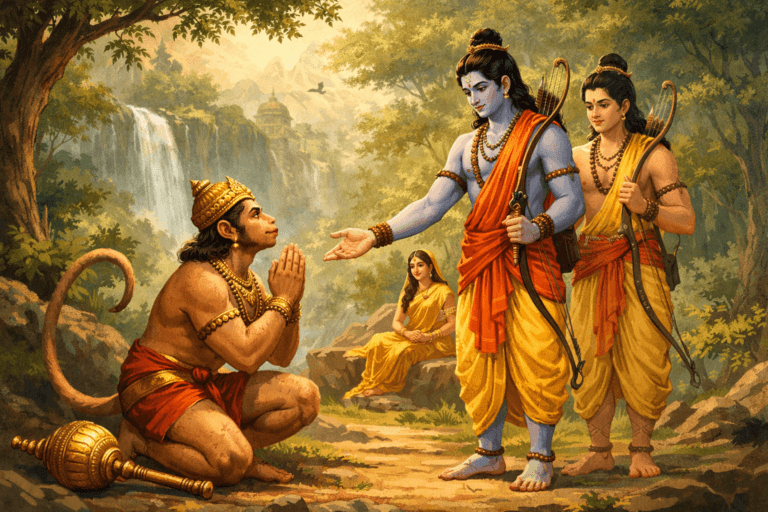In the vast tapestry of religious beliefs, the question of whether Hanuman is a real god often sparks debates and contemplation. With roots deeply embedded in Hindu mythology, Hanuman has transcended his cultural origins to become a symbol embraced by various religions and cultures. Let’s delve into the multifaceted aspects of Hanuman and explore the narratives that surround this revered figure.
Historical Context
Hanuman’s story originates from ancient Hindu scriptures, particularly the Ramayana, where he plays a pivotal role in the quest to rescue Sita, the wife of Lord Rama. While the Ramayana provides a foundational narrative, Hanuman’s presence extends beyond this epic, weaving into various cultural and religious contexts.
Hanuman in Hinduism
In Hinduism, Hanuman is venerated as a god with exceptional devotion and strength. His unwavering loyalty to Lord Rama and his pivotal role in the war against the demon king Ravana make him a revered figure in Hindu mythology. Devotees across the world worship Hanuman for his qualities of courage, humility, and selfless service.
Hanuman in Other Religions
Beyond Hinduism, Hanuman finds a place in Jainism and Buddhism, albeit with different interpretations. Jainism elevates him to the status of a noble hero, while Buddhism casts him in a more quiet role. The cultural exchanges between these religions have led to fascinating adaptations of Hanuman’s story.
Controversies and Debates
In contemporary discussions, scholars and theologians debate the historical accuracy of Hanuman’s existence. Some view him purely as a mythological character, while others argue for the historical authenticity of his deeds. Navigating these debates requires a nuanced understanding of cultural, religious, and historical contexts.
Cultural Impact
Hanuman’s influence extends far beyond religious rituals. He permeates literature, art, and popular culture, symbolizing strength, devotion, and loyalty. Festivals dedicated to Hanuman bring communities together, fostering a sense of shared identity and spiritual connection.
Hanuman’s Attributes
Described as a monkey-faced god with a muscular physique, Hanuman’s attributes carry symbolic significance. His devotion to Rama becomes a metaphor for unwavering faith, and his acts of strength symbolize the triumph of good over evil.
Stories and Legends
Numerous tales surround Hanuman, illustrating his wit, courage, and selflessness. These stories not only entertain but also convey moral lessons, making Hanuman a beloved figure in storytelling traditions.
Hanuman Temples
Around the world, Hanuman temples stand as testament to his global following. Pilgrims embark on journeys to seek blessings and connect with the divine, emphasizing the cultural importance of these sacred spaces.
Hanuman Chalisa
The Hanuman Chalisa, a devotional hymn dedicated to Hanuman, resonates with millions of followers. Devotees recite the Chalisa as a powerful practice, invoking Hanuman’s blessings and divine intervention.
Hanuman in Southeast Asia
Hanuman’s influence extends into Southeast Asia, where he is embraced in various forms. Artistic representations in sculptures, dance, and theater showcase the diverse ways in which Hanuman is revered in different regions.
Comparative Religions
Comparing Hanuman with similar figures in other religions highlights universal themes of heroism, sacrifice, and divine connection. Embracing cross-cultural understanding fosters respect for diverse religious traditions.
Popularity in Modern Times
In the contemporary spiritual landscape, Hanuman remains relevant. His teachings and stories resonate with a global audience, transcending cultural boundaries and inspiring spiritual seekers worldwide.
Exploring the Divine
The question of whether Hanuman is a real god invites us to explore the subjective nature of divinity. Different cultures and individuals perceive the divine through unique lenses, fostering a rich tapestry of beliefs and practices.
Conclusion
In conclusion, the question of Hanuman’s reality as a god invites us to appreciate the multifaceted nature of religious beliefs. Whether seen as a historical figure, a mythological character, or a divine being, Hanuman’s impact on cultures and individuals is undeniable. Embracing diverse perspectives and engaging in open-minded dialogue allows us to navigate the complexities of religious narratives with respect and understanding.
FAQ
Yes, Across various countries, especially in Southeast Asia, devotees actively worship Hanuman, whose influence transcends cultural boundaries.
The Hanuman Chalisa is a devotional hymn that is believed to invoke Hanuman’s blessings and protection when recited with devotion.
Yes, some scholars debate the historical accuracy of Hanuman’s existence, while others view him purely as a mythological figure.
Literature, art, and various forms of entertainment actively portray Hanuman as a symbol of strength and devotion.
Hanuman’s stories have a profound cultural impact, fostering a sense of identity, community, and shared values among devotees.

